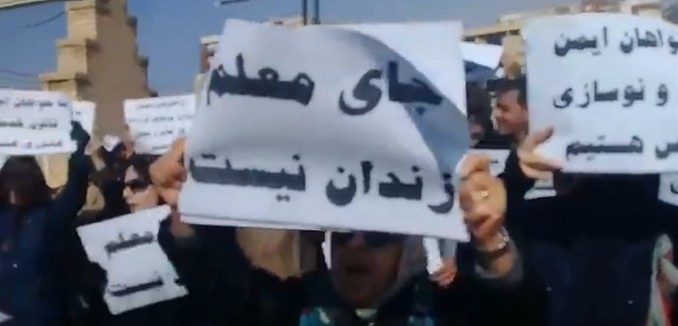France’s Foreign Minister Jean-Yves Le Drian said on Wednesday that he expects a European-backed system to facilitate non-dollar trade with Iran, a so-called Special Purpose Vehicle (SPV) which allows European Union countries to circumvent sanctions imposed by the United States, to take effect in the coming days.
The SPV would act as a financial and commercial intermediary for exports and imports between the Islamic Republic and the EU and will be open to other countries that are trading with Iran. The system would rely on euros or sterling rather than U.S. dollars to minimize the exposure of participating businesses to U.S. sanctions.
The gold-rush mentality seems to be blinding policymakers and investors alike to the brutal nature of the Iranian regime. Trade with Iran is not a risk-free business. It is a Faustian-bargain with one of the world’s leading pariah states that has used the multi-billion-dollar windfall in sanctions relief to repress its own civilian population and wreak havoc in the Middle East.
The main beneficiary from trade with Iran is no other than the country’s hard-line Revolutionary Guard Corps (IRGC) – Quds Force with its extensive tentacles in the economic realm wielding control over strategic industries and black-market enterprises.
The IRGC is Iran’s most powerful security entity and the Quds Force, which projects Iranian influence throughout the region, is spearheading Tehran’s military campaigns in Syria, Iraq, Lebanon, Gaza and Yemen. The IRGC also plays a central role in Iran’s notorious internal security apparatus via the so-called Basij, an arm of the organization that monitors Iranian citizens for compliance with the regime.
And here is where the problem comes full circle. The Guardian reported on Thursday that Iranian authorities arrested more than 7,000 dissidents last year in a sweeping crackdown across the country. Citing a new report from Amnesty International, the newspaper said that at least 26 protesters were killed in anti-regime demonstrations, and nine people died in custody amid suspicious circumstances.
Widespread demonstrations broke out across Iran’s provinces in December 2017, initially sparked by economic grievances but eventually spreading to peaceful political revolt. When the rial, Iran’s currency, hit a new low in June, protesters chanted on the streets, “Death to Palestine,” “No to Gaza, no to Lebanon” and “Leave Syria and think of us.” Other protesters were heard saying, “We don’t want the ayatollahs” and “Death to the dictator.”
Amnesty reported that thousands of these protesters were targeted with live ammunition, tear gas, and water cannon as well as being arbitrarily arrested, flogged, or otherwise punished. The head of Tehran’s Revolutionary Court threatened that detained protesters may face moharebeh — “enmity against God” — charges, which carry the death penalty.
Amnesty described 2018 as “a year of shame for Iran.” The same year European nations rallied around the regime to preserve the disgraced nuclear deal that the U.S. declared unfit to deter Iran’s illicit nuclear and non-nuclear activities.
“Iran appears to value the nuclear deal for the respite that it gives Tehran from sanctions, but doesn’t appear willing to change its aggressive behavior to assuage European fears,” my colleague David Gerstman observed in an op-ed published in the Algemeiner on Thursday. “This begs the question: With Iran’s aggression and deceit in full view, why does Europe cling to the illusion that the nuclear deal will in any way constrain Iran or change the way it behaves?”
Let’s be clear. The major rationale behind Iranian efforts to develop a nuclear capability has been to acquire what may be termed “immunity from prosecution.” Put simply, by possessing nuclear weapons, Iran would be able to deter both the U.S. and regional powers from intervening – militarily or otherwise — in its nefarious activities.
We see this scenario playing out on the battlefields of Syria, Iraq, Yemen, Lebanon and Gaza. The Islamic Republic projects its regional power mainly through a variety of non-state proxies: Hamas in Gaza, Hezbollah in Lebanon and Syria, various Shi’ite militias in Iraq, and Yemen’s Houthi rebels.
It is a shame that the EU, founded first and foremost to preserve European security and stability, has chosen to abandon these principles for blood-stained trade agreements with the theocratic mullah regime. Iran’s persecuted populations deserve better than being sacrificed on the altar of lucrative business deals with a regime that remains one of the worst violators of human rights in the world.
[Photo: Freedom Messenger / YouTube ]




